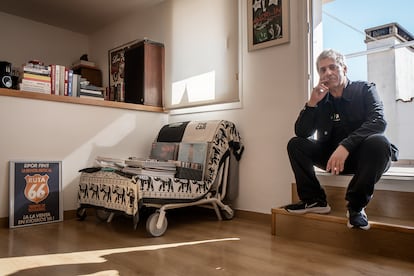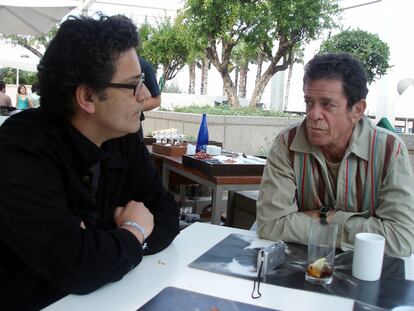Ignacio Julià, the only journalist to make Lou Reed smile
Against the tide of immediacy, the Catalan music critic is committed to long-term radicalism. He recently published and launched a book in New York about his five-decade relationship with Lou Reed and the Velvet Underground


Rock taught Ignacio Julià (Barcelona, 1956) that life’s not all black and white. It’s not even gray, like the uniform of the policemen who charged at concertgoers at the end of a Lou Reed concert in Barcelona in 1975. The concert and subsequent repression shaped the then-amateur filmmaker and budding music critic forever; it was not a concert, it was an epiphany. “He wasn’t allowed to sing ‘Heroin,’ so he played for only an hour, no encores. The atmosphere was a pressure cooker. The audience rioted and the [Spanish police] came in,” Julià recalls in New York, where he just launched Linger On, his book on the Velvet Underground and his five decades of interviews and contacts with the band.
His tome confirms what everyone on the New York music scene already knows: Julià is one of them. He’s friends with John Cale; Lenny Kaye, Patti Smith’s guitarist; Thurston Moore, the founder of Sonic Youth and host of the book launch; and so many others. “[It’s] a dream come true,” he says of the event, which was held at the legendary Algonquin Hotel.
The 1975 concert was not Julià's first contact with American culture. A year earlier, he went to Michigan on a student exchange and discovered that, in the US, there were 40 color television channels as opposed to the black and white of Franco’s TV. “I saw the impeachment of Nixon [for the Watergate case] live [on television], which opened my mind to the world. Also [I saw] Lou Reed, the essence of his music and his lyrics, which opened [my eyes] to taboo subjects in Spain: hard drugs, a different sexuality... That clicked for me.”
Known for eating journalists alive, Reed gave Julià a hard time when he first asked the rock star for an interview in 1977. The journalist had traveled all the way by train to Holland, like a pilgrim in search of a saint, to see Reed. Soon Julià's obsession turned into a profession. “I started writing in [Spanish magazines] Star, Vibraciones, then in Ruta 66, where I still work”; his articles have appeared in EL PAÍS as well. “Rock no longer has the transformative power that it did in the 1950s or 1960s, but Ruta 66 has an audience that is reinventing itself.” Julià was finally able to interview Reed in 1980. They went on to have a close relationship

Julià remembers those early years, before he turned to music criticism (“I discovered that I gave out free records, tickets and drinks,” he laughs). Back then, he wrote about cinema and made super-8 underground films, just like the as-yet unknown Pedro Almodóvar. “Pedrito [Almodóvar] shot epic Roman movies on the outskirts of Madrid. The shorts had no sound, and he would do the voices for all the characters,” Julià recalls, clearly amused. His relationship with cinema, like with music, has been a constant in his life, thanks to filmmaker Manuel Huerga, his “friend since the first day of school.” Huerga captured the Velvet Suite concert at the book launch in Banyoles (Girona), Spain. “We made the film for ourselves, for the love of art, but Filmin bought it for us. It is shot with a single camera and mixes stills from a film of mine from 1977, Andy Warhol style, which was projected during the concert.”
For Julià, this New York book launch represents the end of a cycle. “I won’t be able to repeat this, the film launch in front of 120 people in TriBeCa... I don’t have time for decades-long documentation work [like the one in the book]. But I think it’s extraordinary to have been able to work on this.” He did so to the beat of Reed’s music and lyrics. Julià notes that Reed “was not just a rock star, but a great poet, a great writer who did not make moral judgments; on the contrary, he showed the relativity of things, and the world today is proving him right.”
Sign up for our weekly newsletter to get more English-language news coverage from EL PAÍS USA Edition
Tu suscripción se está usando en otro dispositivo
¿Quieres añadir otro usuario a tu suscripción?
Si continúas leyendo en este dispositivo, no se podrá leer en el otro.
FlechaTu suscripción se está usando en otro dispositivo y solo puedes acceder a EL PAÍS desde un dispositivo a la vez.
Si quieres compartir tu cuenta, cambia tu suscripción a la modalidad Premium, así podrás añadir otro usuario. Cada uno accederá con su propia cuenta de email, lo que os permitirá personalizar vuestra experiencia en EL PAÍS.
¿Tienes una suscripción de empresa? Accede aquí para contratar más cuentas.
En el caso de no saber quién está usando tu cuenta, te recomendamos cambiar tu contraseña aquí.
Si decides continuar compartiendo tu cuenta, este mensaje se mostrará en tu dispositivo y en el de la otra persona que está usando tu cuenta de forma indefinida, afectando a tu experiencia de lectura. Puedes consultar aquí los términos y condiciones de la suscripción digital.








































